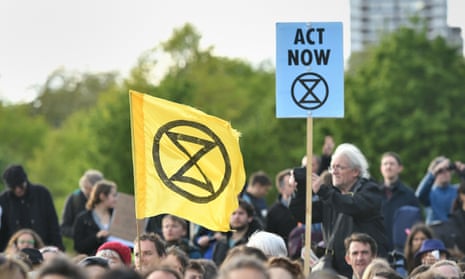Activists who took part in the Extinction Rebellion protests have announced they will stand in the European elections on a “climate emergency” ticket.
Under the name Climate Emergency Independents the new group, which is separate from Extinction Rebellion, nine candidates will stand in the 23 May polls – seven in London and two in south-west England region.
The group said it was inspired by the mass civil disobedience demonstrations on the streets of London over the past two weeks as well by Greta Thunberg and the global school strikes movement she inspired.
“The Climate Emergency Independents are inspired by the Youth Strikes 4 Climate, Greta Thunberg and the Extinction Rebellion movement,” a statement said. “Their collective actions have created in shift in public awareness around the need to urgently act on the emergency.”
The group said it aimed to take the same energy seen on the streets of London to the heart of Europe. “[We want] to demonstrate a different kind of politics that goes beyond party politics. A politics that is more human and ordinary and says, in the face of climate collapse, we can face this together.”
The group has almost identical demands of the EU that Extinction Rebellion (XR) had for the UK government: for politicians to tell the truth about the scale of the crisis, for the formation of a citizens’ assembly and to hit a target of net zero carbon emissions by 2030, rather than 2025 as demanded by XR of the UK government.
One of the candidates, Henry Muss, from north-east London, said: “We are standing to take the work that has been done in London over the past few weeks to a wider audience in Europe … ultimately, and simply put, we hope to stop the burning of fossil fuels and start restoring nature.”
The XR protests were the biggest act of mass civil disobedience in the UK for generations. More than 1,000 people were arrested and four key sites across the capital were occupied for almost a week.
The group already had the backing of hundreds of scientists and academics around the world, and the protests gained the support of senior Labour politicians. The environment secretary, Michael Gove, has agreed to meet its representatives next week.
The “climate rebellion” coincided with two other key interventions: the governor of the Bank of England, Mark Carney, said banks could not ignore climate change, and David Attenborough’s stark documentary setting out the facts of the crisis aired on the BBC.
The protest was rounded off with a visit from Thunberg, the 16-year-old from Sweden who inspired the school strikes movement. Thunberg told MPs in parliament that they had let young people down.
“You lied to us. You gave us false hope. You told us that the future was something to look forward to. You don’t listen to the science because you are only interested in solutions that will enable you to carry on like before,” she said.
Muss said the events of the past two weeks had changed the way people and politicians understood the crisis. “This has undoubtedly been a transformative moment. The truth of the climate and ecological emergency is now out there and government faces two options. We can embrace the truth and start a green industrial revolution, or we can say this will cost business too much and do nothing.”
XR said it had signed up 30,000 new backers or volunteers in the past two weeks and raised almost £200,000, mostly in donations of between £10 and £50, reaching a total of £365,000 since January.
